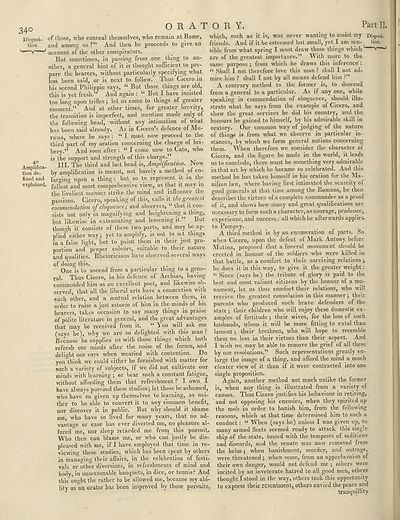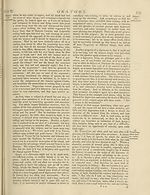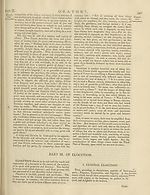Encyclopaedia Britannica > Volume 15, NIC-PAR
(390) Page 340
Download files
Complete book:
Individual page:
Thumbnail gallery: Grid view | List view

340
ORATORY.
4°
Amplifica¬
tion de¬
fined and
explained,
of those, who conceal themselves, who remain at Rome,
anti among us ?” And then he proceeds to give an
account of the other conspirators.
But sometimes, in passing from one thing to an¬
other, a general hint ot it is thought sufficient to pre¬
pare the hearers, without particularly specifying what
has been said, or is next to follow. Ilius Cicero in
his second Philippic says, “ But those things are old,
this is yet fresh.” And again : “ But I have insisted
too long upon trifles; let us come to things of greater
moment.” And at other times, for greater brevity,
the transition is imperfect, and mention made only of
the following head, without any intimation of what
has been said already. As in Cicero’s defence of Mu-
rsena, where he says : “ I must now proceed to the
third part of my oration concerning the charge of bri¬
bery.” And soon after : “ I come now to Cato, who
is the support and strength of this charge.”
HI. The third and last head is, Amplification. Now
by amplification is meant, not barely a method of en¬
larging upon a thing : but so to represent it in the
fullest and most comprehensive view, as that it may m
the liveliest manner strike the mind and influence the
passions. Cicero, speaking of this, calls it the greatest
commendation of eloquence; and observes, “that it con¬
sists not only m magnifying and heightening a thing,
but likewise in extenuating and lessening it.” But
though it consists of these two parts, and may be ap¬
plied either way; yet to amplify, is not to set things
in a false light, but to paint them in their just pro¬
portion and proper colours, suitable to their nature
and qualities. Rhetoricians have observed several ways
of doing this.
One is to ascend from a particular thing to a gene¬
ral. Thus Cicero, in his defence of Archias, having
commended him as an excellent poet, and likewise ob¬
served, that all the liberal arts have a connection with
each other, and a mutual relation between them, in
order to raise a just esteem of him in the minds of his
hearers, takes occasion to say many things in praise
of polite literature in general, and the great advantages
that may be received from it. “ You will ask me
(says he), why we are so delighted with this man ?
Because he supplies us with those things which both
refresh our minds after the noise of the forum, and
delight our ears when wearied with contention. Do
you think we could either be furnished with matter for
such a variety of subjects, if we did not cultivate our
minds with learning •, or bear such a constant fatigue,
without affording them that refreshment ? I own. I
have alwavs pursued these studies-, let those be ashamed,
who have so. given up themselves to learning, as nei¬
ther to be able to convert it to any common benefit,,
nor discover it in public. But why should it shame
me, who have so lived for many years, that no ad¬
vantage or ease has ever diverted me, no pleasure al¬
lured me, nor sleep retarded me from this pursuit.
Who then can blame me, or who can justly be dis¬
pleased with me, if I have employed that time in re¬
viewing these studies, which has been spent by others
in managing their affairs, in the celebration of festi¬
vals or other diversions, in refreshments of mind and
body, in unseasonable banquets, in dice, or tennis? And
this ought the rather to be allowed me, because my abi¬
lity as an. orator has been improved by those pursuits,
Part II.
which, such as it is, was never wanting to assist my Disposi-
friends. And if it be esteemed but small, yet I am sen- non.
sible from what spring I must draw those things which
are of the greatest importance.” With more to the
same purpose j from which he draws this inference':
“ Shall I not therefore love this man ? shall I not ad-
him ? shall I not by all means defend him ?”
A contrary method to the former is, to descend
from a general to a particular. As if any one, while
speaking in commendation of eloquence, should illu¬
strate what he says from the example of Cicero, and
show the great services he did his country, and the
honours he gained to himself, by his admirable skill in
oratory. Our common way of judging of the nature
of things is from what we observe in particular in¬
stances, by which we form general notions concerning
them. When therefore we consider the character of
Cicero, and the figure he made in the world, it leads
us to conclude, there must be something very admirable
in that art by which he became so celebrated. And this,
method he has taken himself in his oration for the Ma-
nilian law, where having first intimated the scarcity of
good generals at that time among the Romans, he then
describes the virtues of a complete commander as a proof
of it, and shows how many and great qualifications are
necessary to form such a character, as courage, prudence,
experience, and success: all which he afterwards applies-
to Pompey.
A third method is by an enumeration of parts. So
when Cicero, upon the defeat of Mark Antony before
Mutina, proposed that a funeral monument should be
erected in honour of the soldiers who were killed in
that battle, as a comfort to their surviving relations -r
he does it in this way, to give it the greater weight:
“ Since (says he) the tribute of glory is paid to the
best and most valiant citizens by the honour of a mo¬
nument, let us thus comfort their relations, who will
receive the greatest consolation in this manner; their
parents who produced such brave defenders of the
state j their children who will enjoy these domestic ex¬
amples of fortitude ; their wives, for the loss of such
husbands, whom it will be more fitting to extol than
lament; their brethren, who will hope to resemble
them no less in their virtues than their aspect. And
I wish we may be able to remove the grief of all these
by our resolutions.” Such representations greatly en¬
large the image of a thing, and afford the mind a much
clearer view of it than if it were contracted into one
single proposition.
Again, another method not much unlike the former
is, when any thing is illustrated from a variety of
causes. Thus Cicero justifies his behaviour in retiring,
and not opposing his enemies, when they spirited up
the mob in order to banish him, from the iollowing
reasons, which at that time determined him to such a
conduct: “ When (says he) unless I was given up, so
many armed fleets seemed ready to attack this single
ship of the state, tossed with the tempests of seditions
and discords, and the senate was now removed from
the helm j when banishment, murder, and outrage,
were threatened; when some, from an apprehension of
their own danger, would not defend me ; others were
incited by an inveterate hatred to all good men, others
thought I stood in the way, others took this opportunity
to express their resentment, others envied the peace and
tranquillity
ORATORY.
4°
Amplifica¬
tion de¬
fined and
explained,
of those, who conceal themselves, who remain at Rome,
anti among us ?” And then he proceeds to give an
account of the other conspirators.
But sometimes, in passing from one thing to an¬
other, a general hint ot it is thought sufficient to pre¬
pare the hearers, without particularly specifying what
has been said, or is next to follow. Ilius Cicero in
his second Philippic says, “ But those things are old,
this is yet fresh.” And again : “ But I have insisted
too long upon trifles; let us come to things of greater
moment.” And at other times, for greater brevity,
the transition is imperfect, and mention made only of
the following head, without any intimation of what
has been said already. As in Cicero’s defence of Mu-
rsena, where he says : “ I must now proceed to the
third part of my oration concerning the charge of bri¬
bery.” And soon after : “ I come now to Cato, who
is the support and strength of this charge.”
HI. The third and last head is, Amplification. Now
by amplification is meant, not barely a method of en¬
larging upon a thing : but so to represent it in the
fullest and most comprehensive view, as that it may m
the liveliest manner strike the mind and influence the
passions. Cicero, speaking of this, calls it the greatest
commendation of eloquence; and observes, “that it con¬
sists not only m magnifying and heightening a thing,
but likewise in extenuating and lessening it.” But
though it consists of these two parts, and may be ap¬
plied either way; yet to amplify, is not to set things
in a false light, but to paint them in their just pro¬
portion and proper colours, suitable to their nature
and qualities. Rhetoricians have observed several ways
of doing this.
One is to ascend from a particular thing to a gene¬
ral. Thus Cicero, in his defence of Archias, having
commended him as an excellent poet, and likewise ob¬
served, that all the liberal arts have a connection with
each other, and a mutual relation between them, in
order to raise a just esteem of him in the minds of his
hearers, takes occasion to say many things in praise
of polite literature in general, and the great advantages
that may be received from it. “ You will ask me
(says he), why we are so delighted with this man ?
Because he supplies us with those things which both
refresh our minds after the noise of the forum, and
delight our ears when wearied with contention. Do
you think we could either be furnished with matter for
such a variety of subjects, if we did not cultivate our
minds with learning •, or bear such a constant fatigue,
without affording them that refreshment ? I own. I
have alwavs pursued these studies-, let those be ashamed,
who have so. given up themselves to learning, as nei¬
ther to be able to convert it to any common benefit,,
nor discover it in public. But why should it shame
me, who have so lived for many years, that no ad¬
vantage or ease has ever diverted me, no pleasure al¬
lured me, nor sleep retarded me from this pursuit.
Who then can blame me, or who can justly be dis¬
pleased with me, if I have employed that time in re¬
viewing these studies, which has been spent by others
in managing their affairs, in the celebration of festi¬
vals or other diversions, in refreshments of mind and
body, in unseasonable banquets, in dice, or tennis? And
this ought the rather to be allowed me, because my abi¬
lity as an. orator has been improved by those pursuits,
Part II.
which, such as it is, was never wanting to assist my Disposi-
friends. And if it be esteemed but small, yet I am sen- non.
sible from what spring I must draw those things which
are of the greatest importance.” With more to the
same purpose j from which he draws this inference':
“ Shall I not therefore love this man ? shall I not ad-
him ? shall I not by all means defend him ?”
A contrary method to the former is, to descend
from a general to a particular. As if any one, while
speaking in commendation of eloquence, should illu¬
strate what he says from the example of Cicero, and
show the great services he did his country, and the
honours he gained to himself, by his admirable skill in
oratory. Our common way of judging of the nature
of things is from what we observe in particular in¬
stances, by which we form general notions concerning
them. When therefore we consider the character of
Cicero, and the figure he made in the world, it leads
us to conclude, there must be something very admirable
in that art by which he became so celebrated. And this,
method he has taken himself in his oration for the Ma-
nilian law, where having first intimated the scarcity of
good generals at that time among the Romans, he then
describes the virtues of a complete commander as a proof
of it, and shows how many and great qualifications are
necessary to form such a character, as courage, prudence,
experience, and success: all which he afterwards applies-
to Pompey.
A third method is by an enumeration of parts. So
when Cicero, upon the defeat of Mark Antony before
Mutina, proposed that a funeral monument should be
erected in honour of the soldiers who were killed in
that battle, as a comfort to their surviving relations -r
he does it in this way, to give it the greater weight:
“ Since (says he) the tribute of glory is paid to the
best and most valiant citizens by the honour of a mo¬
nument, let us thus comfort their relations, who will
receive the greatest consolation in this manner; their
parents who produced such brave defenders of the
state j their children who will enjoy these domestic ex¬
amples of fortitude ; their wives, for the loss of such
husbands, whom it will be more fitting to extol than
lament; their brethren, who will hope to resemble
them no less in their virtues than their aspect. And
I wish we may be able to remove the grief of all these
by our resolutions.” Such representations greatly en¬
large the image of a thing, and afford the mind a much
clearer view of it than if it were contracted into one
single proposition.
Again, another method not much unlike the former
is, when any thing is illustrated from a variety of
causes. Thus Cicero justifies his behaviour in retiring,
and not opposing his enemies, when they spirited up
the mob in order to banish him, from the iollowing
reasons, which at that time determined him to such a
conduct: “ When (says he) unless I was given up, so
many armed fleets seemed ready to attack this single
ship of the state, tossed with the tempests of seditions
and discords, and the senate was now removed from
the helm j when banishment, murder, and outrage,
were threatened; when some, from an apprehension of
their own danger, would not defend me ; others were
incited by an inveterate hatred to all good men, others
thought I stood in the way, others took this opportunity
to express their resentment, others envied the peace and
tranquillity
Set display mode to:
![]() Universal Viewer |
Universal Viewer | ![]() Mirador |
Large image | Transcription
Mirador |
Large image | Transcription
Images and transcriptions on this page, including medium image downloads, may be used under the Creative Commons Attribution 4.0 International Licence unless otherwise stated. ![]()
| Encyclopaedia Britannica > Encyclopaedia Britannica > Volume 15, NIC-PAR > (390) Page 340 |
|---|
| Permanent URL | https://digital.nls.uk/192586768 |
|---|
| Attribution and copyright: |
|
|---|
| Shelfmark | EB.11 |
|---|---|
| Description | Ten editions of 'Encyclopaedia Britannica', issued from 1768-1903, in 231 volumes. Originally issued in 100 weekly parts (3 volumes) between 1768 and 1771 by publishers: Colin Macfarquhar and Andrew Bell (Edinburgh); editor: William Smellie: engraver: Andrew Bell. Expanded editions in the 19th century featured more volumes and contributions from leading experts in their fields. Managed and published in Edinburgh up to the 9th edition (25 volumes, from 1875-1889); the 10th edition (1902-1903) re-issued the 9th edition, with 11 supplementary volumes. |
|---|---|
| Additional NLS resources: |
|

